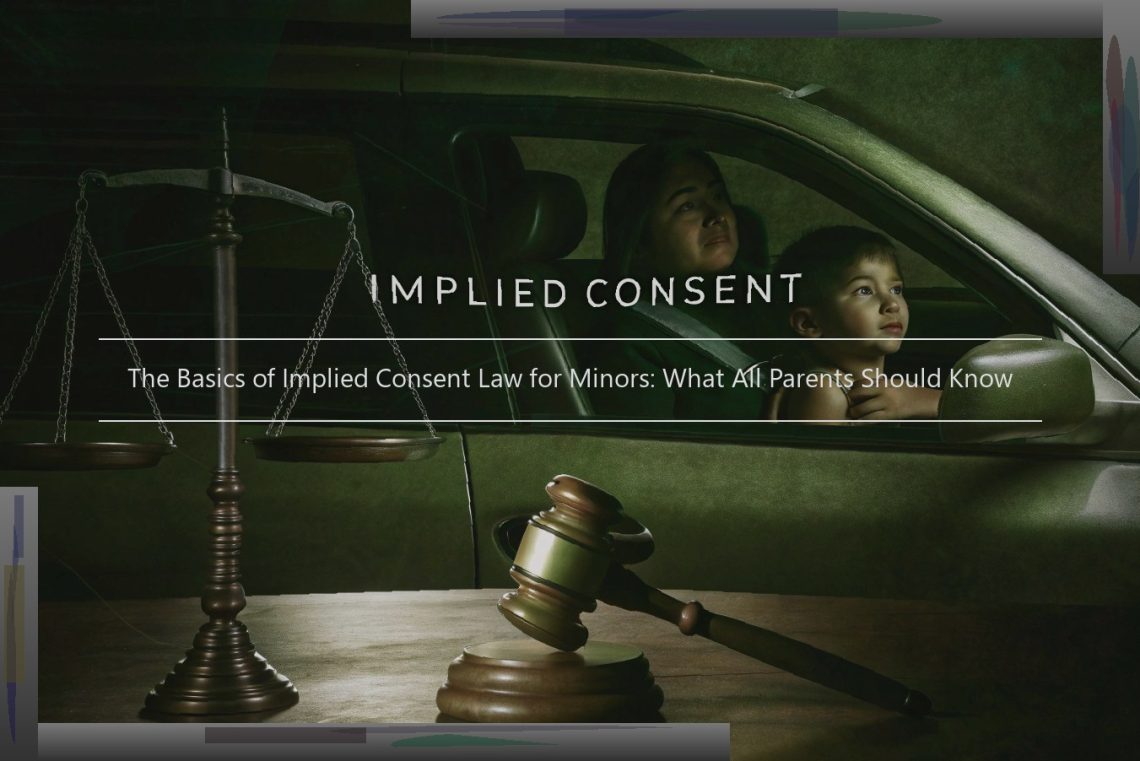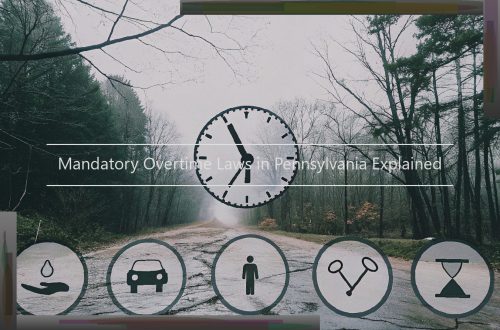
The Basics of Implied Consent Law for Minors: What All Parents Should Know
Implied Consent Law – An Introduction
Implied consent is a legal principle that establishes an individual’s agreement to allow something to happen without explicitly stating so. It’s often used in situations where a clear and direct consent cannot be reasonably be obtained. In this way, implied consent flows from the presence of an action or conduct that suggests agreement by the individual. In other words, its absence of objection to a situation is presumed to equal agreement when such a presumption can be seen as reasonable in that scenario. The principle of implied consent is often used in the context of emergency medical treatment, and such situations are expressly covered in California’s Vehicle Code section 679.94 . The law establishes that the consent of a minor under the age of 12 years is "presumed, in the absence of notice to the contrary," when a vehicle is operated by a mother or father, or a responsible person over the age of 18 traveling with two or more minor children. In other words, the mere fact that the vehicle is being driven by a parent, guardian, or other responsible adult suggests consent for all minors in the vehicle to be transported by that driver, unless there is an affirmative indication otherwise (i.e. the minor explicitly states in some way other than merely being quiet that he or she doesn’t want that driver to transport him or her). Essentially, it’s a legal idea that the definition of consenting to something involves action in the absence of a clear objection to doing it.
Implied Consent Law and Minors
Some states do specifically tailor the implied consent law for minors since minors tend to have some different issues to be considered in these cases. Before being arrested for a DUI, children who did not have a license could still be arrested but the implied consent statute would not apply and a child could NOT be forced into consent since that would not be legal under any level of age.
If you simply refuse to take the test and you are NOT 21 years old, then the police officer must honor your right not to take the test. If you are a minor, you will not be charged with an implied consent violation in the same way that you would be under implied consent if you were an adult. In most states, there are certain statutes dealing with minors and implied consent laws. There is usually some consideration given to minors in that there is no additional one year suspension of driving if you are under 21 years old on implied consent violations. The statutory violation of refusal and implied consent is not cited against you in the same way that it is against an adult. The implied consent law will dictate a suspension of the driver’s license for a period of time, but if you are underage and technically ineligible for a license, the suspension may not apply to you in the same way.
In Georgia and in other states, the implied consent laws for minors are still applicable and they will face the same 30 day suspension of driving and the blood test refusal penalties, etc., as adults. The main difference is that they may not face the same higher criminal offenses as adults do, but they will still be subject to the same civil penalties as adults.
However, some states treat minors differently regarding a person having to submit to a blood collection. They may have limitations on having blood drawn from a minor. Normally, there will be some implied consent law for minors in every state but they will be subject to the same civil penalties as adults.
How Minors Are Affected by Implied Consent Laws and Testing
Parents often worry about what will happen if they are unable to provide medical consent for their minor child in a time of crisis. Implied consent may be presumed in those circumstances. In fact, Delaware law specifically addresses this issue: § 707. Presumption of consent in emergency. (a) An unemancipated minor who is not married or judicially independent may give effective consent to surgical or other invasive procedures, diagnostic testing and medical treatment. Such consent may be given on behalf of any unemancipated minor if such minor is a child of the person consenting or if such minor is living apart from such parent or guardian and is without the other parent or guardian’s consent. (b) Whenever treatment is needed for the physical or mental well-being of an unemancipated minor, the minor’s consent shall be presumed whenever the minor is supported wholly or partially by and resides with a person or institution who fosters or for pay houses, clothes or otherwise cares for such minor. (c) Consent for treatment may also be presumed where delay would adversely affect the safety or health of the minor. (d) The consent of a parent or guardian shall not be necessary where an unemancipated minor has been previously diagnosed as having a sexually transmitted disease, drug addiction, pregnancy or mental illness, nor shall the consent be necessary where the parent or guardian has refused to give consent for treatment or is unable to be contacted." (16 Del. C. § 707). In an emergency situation, parental permission or authorization for medical care may be effectively given when a parent is not available and has not objected to the care.
Ability to Drive and Implied Consent for Minors
Under implied consent laws, every driver is deemed to have given their consent to a breath test. In Georgia, the Georgia Implied Consent Law is set out in O.C.G.A. § 40-5-67.1. This law is how the State of Georgia administers breath tests to alleged drunk drivers. The law further provides a sample of the blood of the arrested driver may be drawn by a physician or an employee of a local hospital, some authorized county or municipal facility, or other duly licensed medical personnel.
As you might guess, there are special rules when it comes to who can give consent on behalf of minors. In Georgia, the Implied Consent Law contains an exception when the "person is under the age of 21 years … ." (See O.C.G.A. § 40-5-67.1 (b)(1)). This means that because they are legally unable to consent on their own – due to being under the age of 21 – parents have the legal authority to consent on a minor’s behalf.
Because minors have not yet reached the legal drinking age, there are additional prohibitions on minors pertaining to the legal amount of alcohol that can be consumed. In Georgia, if a minor is found to be drinking alcohol and has a breath test Blood Alcohol Concentration of any more than .02 grams, the minor will be punished as a zero tolerance driver. (See O.C.G.A. § 40-6-391 (b-1)). This is another motivation for parents to agree to permit a breath test to be given if a minor is arrested for D.U.I. – so the minor will not have an automatic suspension.
Minor’s Laws Regarding Legal Rights and Responsibilities
In Georgia and many other states, a minor (anyone under the age of 18) is not allowed to enter into contracts, including consent to a breath test, because being underage automatically voids any agreement. This does not apply to a minor’s implied consent to provide a breath sample by a law enforcement officer in an arrest setting (for example, DUI). Implied consent law for minors allows parents or guardians (acting on the minor’s behalf) the ability to consent to the breath or blood test when a minor is arrested.
For a parent or guardian to legally consent to a breath test or blood test on behalf of their minor child, the consent of a parent or legal guardian must be voluntary and parental or legal guardian status must be confirmed. Without such , the minor is not bound by implied consent law. Consent may also be conditional for minors; even if a minor provides consent to a breath test, that consent can be revoked at any time, which would exclude any results from the revocation forward. If a legal guardian refuses to submit the minor to the implied consent law, the minor cannot be forced to take the requested breath test.
Regardless of whether or not a minor chooses to submit to a breath test or blood test, consequences for any type of conviction will be much more severe than those issued against non-minor DUI offenders. Parents and legal guardians face the additional responsibilities of seeking the permission of a minor to serve a sentence and/or pay any fines, since it is the minor whose conviction is in play.
Case Examples and Legal Precedents
A few cases in particular have provided guidance in how the issue of implied consent is addressed in court. In Meyer v. New Jersey, the Supreme Court of New Jersey stated that "the parent or guardian who permits a minor child to drive a motor vehicle implicitly gives his consent to the operation of the car by the child on all occasions…" Similarly, in Gillman v. Perez, the Superior Court of New Jersey held that regardless of whether the vehicle was owned or borrowed, implied consent on the part of the owner still existed, and therefore the owner was financially responsible for the actions of a minor who was driving the car at the time of the accident. Cases like Hammer v. Landis, Bachmann v. Clark, and Martin v. Vassel have followed the precedent set by the Meyer ruling. All three of these cases hold that even if a car is owned by the parent or legal guardian of a minor, the minor may drive the vehicle without the owner’s express consent, and the owner will still be responsible for accidents and insurance claims related to that minor’s driving.
Conclusion: Understanding Implied Consent Laws and Testing for Minors
As this post has discussed, when dealing with a minor, the police have the ability to obtain a sample of their breath or blood in certain scenarios without first obtaining a parent’s consent. Because of this, even a minor can be forced to submit to a chemical test.
The implied consent law broadly allows for law enforcement to require a chemical test for minors if there is probable cause to believe that the minor has committed a driving offense such as not wearing a seatbelt, improper lane change, failure to stop for a stop sign or lights, or even if the minor is found to be drinking in some fashions in a car even if they are of legal age . If the minor refuses to submit to a chemical test, there can be serious penalties.
Advisory: If you or your child is a minor and are being asked for a chemical test while operating a motor vehicle, get legal advice immediately from an attorney who has experience with these laws. The laws and situations surrounding minors and implied consent can vary greatly.




